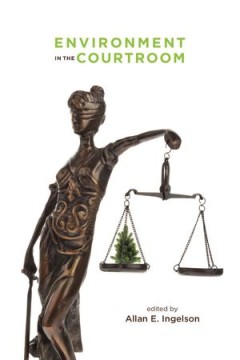Filter by

The Conceptual Change of Conscience : Franz Wieacker and German Legal Histori…
How did the drastic experiences of the turbulent twentieth century affect the works of a legal historian? What kind of an impact did they have on the ideas of justice and rule of law prominent in legal historiography? Ville Erkkilä analyses the way in which the concepts of 'Rechtsgewissen' and 'Rechtsbewusstsein' evolved over time in the works of the prestigious legal historian Franz Wieacker.…
- Edition
- -
- ISBN/ISSN
- 9783161566912
- Collation
- XIII, 314 halaman
- Series Title
- -
- Call Number
- 340 ERK c

Agriculture and Food Security in China : What Effect WTO Accession and Region…
China’s accession to the World Trade Organization (WTO) has had profound consequences for the structure of its economy, and there will many more before the full benefits of an open trading regime will be realised. Agriculture and Food Security in China explains the background to China’s WTO accession and links accession to reforms beginning as far back as 1979. The book highlights China’s…
- Edition
- -
- ISBN/ISSN
- 9781921313646
- Collation
- -
- Series Title
- -
- Call Number
- 337 CHE a

Asian Socialism and Legal Change : The dynamics of Vietnamese and Chinese Reform
Although the immense process of economic and social transformation currently underway in China and Vietnam is well known, less attention has been devoted to the process of Chinese and Vietnamese legal change. Asian Socialism and Legal Change brings together experts to analyse recent developments in the legal sphere, representing the diversity and dynamism of this process. This book is the fi…
- Edition
- -
- ISBN/ISSN
- 9781920942274
- Collation
- -
- Series Title
- -
- Call Number
- 340 ASI

Australian Clinical Legal Education : Designing and operating a best practice…
Clinical legal education (CLE) is potentially the major disruptor of traditional law schools’ core functions. Good CLE challenges many central clichés of conventional learning in law—everything from case book method to the 50-minute lecture. And it can challenge a contemporary overemphasis on screen-based learning, particularly when those screens only provide information and require no int…
- Edition
- -
- ISBN/ISSN
- 9781760461034
- Collation
- -
- Series Title
- -
- Call Number
- 340 EVA a

A Bird that flies with two wings : Kastom and state justice systems in Vanuatu
This book investigates the problems and possibilities of plural legal orders through an in-depth study of the relationship between the state and customary justice systems in Vanuatu. It argues that there is a need to move away from the current state-centric approach to law reform in the South Pacific region, and instead include all state and non-state legal orders in development strategies and …
- Edition
- -
- ISBN/ISSN
- 9781921536793
- Collation
- -
- Series Title
- -
- Call Number
- 340 FOR b

A Formula Book of English Official Historical Documents
This 1909 work forms a second supplement to Hall's Studies in English Official Historical Documents. It gives examples of a wide range of English ministerial and judicial documents from the ninth to the seventeenth centuries. These are arranged according to type and purpose, the majority in Latin. The intention is to assist the user of such archival materials, by familiarising them with the for…
- Edition
- Hubert Hall
- ISBN/ISSN
- 9780511696923
- Collation
- -
- Series Title
- Cambridge Library Collection - Medieval History
- Call Number
- -

Analogy and Exemplary Reasoning in Legal Discourse
This book brings together contributions from leading figures in legal studies on analogy and related forms of reasoning in the law. Analogical reasoning-which relies on the concept of two different things being in some way like each other-is hugely important not just in the practice of law, but it is nonetheless strongly contested.
- Edition
- -
- ISBN/ISSN
- 9789048537143
- Collation
- 196 halaman
- Series Title
- -
- Call Number
- 340 KAP a

Euthanasia and Law in the Netherlands
The Netherlands is the only country in the world in which euthanasia, under narrow-defined circumstances, is legally permissible. Considerable attention has been paid over a number of years to the problem of regulating it and information has been systematically collected concerning actual practice. Therefore the Dutch experience is of interest not only to the Dutch, but to anyone who is conside…
- Edition
- -
- ISBN/ISSN
- 9789053562758
- Collation
- 382 halaman
- Series Title
- -
- Call Number
- 340 GRI e

In Search of Effective Disability Policy : Comparing the Developments and Out…
In Search of Effective Disability Policy examines the potentials of two very different strategies of integrating disabled people into the working life. In the Netherlands employers have great responsi-bility for the integration. In contrast employers have limited responsibility in the Danish strategy, where public authorities are crucial. This book finds that there are virtues and drawbacks of …
- Edition
- -
- ISBN/ISSN
- 9789053566442
- Collation
- 208 halaman
- Series Title
- -
- Call Number
- 362 HOG s

Environment in the Courtroom
Canadian environmental law is a dynamic and exciting area that is playing an increasingly important role in furthering sustainable development policy. Environmental law has distinctive relevant principles, operating procedures, implications, and importance in comparison with other areas of law, and these distinctions must be appreciated both within the legal community and by all those who are c…
- Edition
- -
- ISBN/ISSN
- 9781552389867
- Collation
- -
- Series Title
- -
- Call Number
- 370 ENV
 Computer Science, Information & General Works
Computer Science, Information & General Works  Philosophy & Psychology
Philosophy & Psychology  Religion
Religion  Social Sciences
Social Sciences  Language
Language  Pure Science
Pure Science  Applied Sciences
Applied Sciences  Art & Recreation
Art & Recreation  Literature
Literature  History & Geography
History & Geography